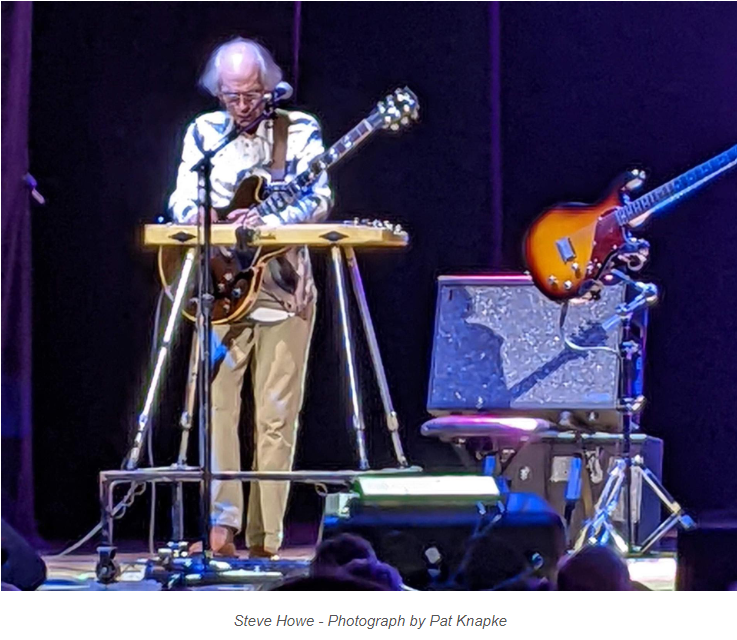A-D-G-D-G-D-G-A
 The topic of music comes up sometimes in this column as it is an interest of mine. I can usually find something worthwhile in almost any genre of music, but my main musical passion is “progressive rock”, particularly from the 1970s and 80s. Instead of going all academic and explaining what progressive rock is in musical terms, I can cut to the chase and list some of my more favorite artists of this genre so you can get the gist: Yes, Rush, Genesis, Emerson Lake, and Palmer to name a few. Their music is typified by complex structures, instrumental virtuosity, multiple tempo changes, odd time signatures, and often 20-minute-long songs that would never get played on the radio.
The topic of music comes up sometimes in this column as it is an interest of mine. I can usually find something worthwhile in almost any genre of music, but my main musical passion is “progressive rock”, particularly from the 1970s and 80s. Instead of going all academic and explaining what progressive rock is in musical terms, I can cut to the chase and list some of my more favorite artists of this genre so you can get the gist: Yes, Rush, Genesis, Emerson Lake, and Palmer to name a few. Their music is typified by complex structures, instrumental virtuosity, multiple tempo changes, odd time signatures, and often 20-minute-long songs that would never get played on the radio.
This was at times difficult for me during the teenage years because this was music that chicks were definitely not into. Lesson learned: put in an 8-track of anything by Jethro Tull and your date will come to an abrupt end.
I had the joy of seeing the latest incarnation of Yes perform recently in a relatively small venue, at least small in comparison to the big arenas they would have played in the 70s and 80s. Guitarist Steve Howe was the only original member in the band. It is a little weird seeing such concerts because I of course am no spring chicken, so these musical heroes of mine are getting up there in years. Mr. Howe looked much closer to Doc Brown from Back to the Future than the tie-dyed long-haired hippie I remember from my youth. But his skills are still there. At one point, he had 3 separate guitars on or near him in order to play all of the parts for the song And You and I. As a guitar player myself, I was watching intently to see if I could figure out how he was doing it.
Of course, there is musical virtuosity in all genres. I am not completely a progressive rock snob or chauvinist. Just because music is simple in structure (and songs are only 3 minutes long instead of 20) does not mean it is easy to play or perform. For example, AC/DC’s music is simple in structure and I dare say I could teach any of you the guitar chords (all 5 of them) to play most AC/DC songs. Riffing through AC/DC songs on guitar by yourself using your own internal clock can make you think you are ready to join the band. The rub is that there have to be 5 people all on the same clock to make it sound good. AC/DC’s music may be simple in structure but it is very hard to play as a group.
I was such a deluded guitar-riffing teenager who hung out with other such deluded wanna-be musicians who tried to play AC/DC in a garage band. Dogs howled, small children ran and hid under something heavy, and the police were summoned. It did not take long for us to realize that we did not sound like the record, much to the delight of our parents, neighbors, and ringing ears.
 Sometimes I can draw parallels between my thoughts on music and perhaps how some out there view motor rollers and such. I am sure there are lots of folks who have thought or even said out loud “It's just ‘cornveyor’, how hard can it be?” It is certainly true that causing cartons to move on turning rollers does not require multi-axis motion algorithms nor finely tuned PID loop programming like precision robotics and motion require, but there is still a certain elegance behind making, what appears on the surface to be simple, conveyors function.
Sometimes I can draw parallels between my thoughts on music and perhaps how some out there view motor rollers and such. I am sure there are lots of folks who have thought or even said out loud “It's just ‘cornveyor’, how hard can it be?” It is certainly true that causing cartons to move on turning rollers does not require multi-axis motion algorithms nor finely tuned PID loop programming like precision robotics and motion require, but there is still a certain elegance behind making, what appears on the surface to be simple, conveyors function.
Take for example making a 5 to 1 sawtooth merge work with nothing but coils, timers, and one-shots in your PLC program. On one hand, it is simple 3-chord rock and roll.
When those slugs of cartons go by without running into each other and are visually evenly spaced, there generally is not a lot of wonder because that is what is supposed to happen just like the A-D-G-D-G-D-G-A chords in AC/DC’s Highway to Hell are supposed to go.
But on the other hand as the programmer, you understand what precision was required to make it happen even if it wasn’t the programming equivalent of Keith Emerson’s Hammond B3 keyboard on Karn Evil 9 (1st Impression).
I don’t get to do much PLC work anymore. I do not miss being in a sweltering warehouse in Texas when it is 95° in the shade with a customer glowering over my shoulder, but I sometimes miss the quiet satisfaction of watching something work as I programmed it. I also have never learned how to play like Steve Howe, but if I don’t have to play with 5 other people’s internal metronomes, I can still belt out a mean “Whole Lotta Rosie” until my wife and daughter make me stop. As I always say with the electric guitar, you can always make up for lack of skill by playing louder.
Rock on,

